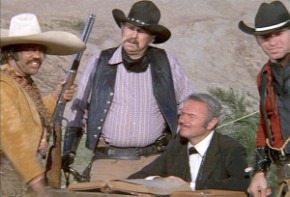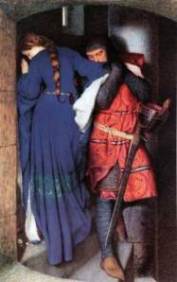Notable things this post:
This is the end of the medieval section, next up is 16th century
We’re going to be passing page 300 (just 2,448 to go!)
I have already read a more difficult translation of this piece than what Norton offers, so woohoo on that
We’ve come to something very recognizable in the realm of medieval literature, Sir Thomas Malory’s Morte Darthur. Caxton’s printer version of Malory is a big heavy book (my copy is red, in case that matters), so what we’re getting here is just an excerpt. I love the word excerpt, it’s such a mash of consonants.
The fascinating thing about the intro to Sir Thomas Malory in Norton is that apparently we knew almost nothing about him until the 20th century, when his criminal records were found. There’s a laundry list of violent crimes that would earn him a better place in Hedley Lamarr’s recruitment line to than a seat at Arthur’s round table. A story like this is made to be reproduced onto every new available medium, and off the top of my head I can think of about a dozen film, tv, novelization and stage productions of this version of the Arthur story. I saw a lovely version just two years ago at the Stratford Festival. Of course with all these adaptations, as usual, the foremost in my mind anytime Arthur is mentioned will be Monty Python’s Holy Grail.
First sentence count of the word “lusty”: three.
This excerpt opens with a lusty May, and two of the knights (Mordred of course, and Agravain) telling Gawain, Gaheris and Gareth how tired they are of the embarrassment of Lancelot sleeping with the queen “daily and nightly”, and everyone but Arthur knowing. The three G’s say they’ll have no part of telling Arthur, both for the peace of the kingdom and because they all owe Lancelot their lives multiple times over. Turns out the king had had his own suspicions about Lancelot and Guinevere (come on, night AND day and he wouldn’t find out???) but demands proof.
They set a trap for Lancelot and the queen, and even though Admiral Ackbar Sir Bors warns Lancelot that it’s a trap, he goes to the queen’s chamber anyway. Realizing that they’re discovered, there’s a rather amusing scene that probably shouldn’t be amusing of Lancelot realizing that he’s going to be defeated for the first time because he’s naked and out of his armour. If he hadn’t been so arrogant to Sir Bors and listened to him this totally wouldn’t have happened.
Lancelot knows that if he’s taken by Arthur’s knights he’ll be executed as a traitor, and Guinevere realizes that she’ll be burned for her infidelity to the king. Lancelot promises that his knights will protect her from burning if he dies, but she says that if he dies, she doesn’t plan to outlive him long, and that if he is slain she’ll accept death meekly. You might be thinking some Romeo and Juliet business right about now, but I’m totally picturing the scene between Mustang and Hawkeye from Fullmetal Alchemist: Brotherhood when she tells him that if she has to shoot him for abusing his powers, she doesn’t plan on outliving him by long, so to stop what he’s doing.
Lancelot is an odd mix of romantic words to his lover and arrogant speeches about his own strength if he had been armed. Lancelot let just one of the king’s knights through the door, knocks him out and steals his armour. He tells the knights through the door to leave him alone and that tomorrow he’ll present himself to the king and tell the court the perfectly innocent reason he was hanging out in the queen’s chamber. They’re having none of that, so Lancelot goes out and kills everyone but Mordred, whom he wounds. Lancelot promises that he will rescue Guinevere, that Arthur is now his mortal enemy, and they exchange rings.
Meanwhile at court Arthur tells his knights to bring Guinevere to the fires to receive her judgment. The knights refuse, unable to bring their queen to her execution. Minor knights go get the queen and strip her down to her smock. She’s given a priest to confess and make herself ready for death. Lancelot rides in and kills just about everyone, including his friends. If you’re looking for a precedent for the scene in Holy Grail where John Cleese as Lancelot rides into the wedding and kills everyone, he it is. Lancelot scoops up Guinevere and they live happily ever after shacked up in Lancelot’s homeland.
Arthur hears about the massacre of his knights at the execution (around 40 knights dead) and is devastated. He tells everyone not to tell Sir Gawain that Lancelot killed his brothers Gareth and Gaheris, stating that Gawain will not only go out of his mind, but won’t rest until the score is settled. Gawain finds out, and there is a LOT of swooning.
They prepare for battle with Lancelot, calling up knights across the country telling them that he has stolen Arthur’s queen. The night before battle Arthur has a dream, and Gawain interprets it for him the next morning stating that if Arthur fights in the battle he will die. Arthur makes preparations for a betrayal by Sir Mordred and tells his knights that if there’s any funny business, kill Mordred. Mordred makes the same arrangement with his knights, not trusting Arthur.
Mordred and Arthur survive the battle, but come across each other on the field of bodies. Arthur runs at Mordred, dealing him a deathblow, and with Mordred’s last strength he deals a deathblow to Arthur. While Arthur is dying he tells Bedivere to take Excalibur and throw it into the water. Twice Bedivere lies, thinking it a shame to waste a pretty sword so important to the crown, and Arthur can tell he’s lying. When he does what Arthur told him to do a lady comes from the water and catches the sword. They bring Arthur to the water and give him to the water ladies to place on a boat. Arthur tells Bedivere that he has tarried to long and that the women would take him to Avalon to sleep and heal.
Malory gives some notes about popular beliefs that Arthur is not dead, and mentions the Latin version of the once and future king.
Following is an excerpt about the deaths of Lancelot and Guinevere. Turns out Guinevere had been living in a nunnery, and after dreaming of her dead, Lancelot visits and finds her dead. The nuns tell him that the queen had said she hoped to never lay mortal eyes on Lancelot again and wished to be buried with Arthur. Lancelot gives her a good, rich, holy send off, but is chastised by the priests for mourning like a husband for her. He explains that seeing her lie in state beside her proper husband made him grieve for his part in the destruction of their marriage, their self-respect, their deaths, and the sin he led Guinevere into. After this he refuses food or drink and allows himself to waste away into death, grieving for both the king and queen. After Lancelot dies, is grieved by all knights, is given all the pomp and grandeur in death, is a new king of England chosen.
And so ends the medieval age!
No? Something more romantic maybe?


